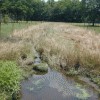Resumen
BMPs are an important tool in helping the state and individual landowners protect and enhance state’s waters. Given the water quality issues facing Lake Okeechobee and other sensitive water bodies, the importance of BMP implementation has increased since their official establishment as part of the FWRA. In order to ensure that BMPs are reducing nutrient loadings, on-farm research is needed to verify BMP effectiveness. A four-year study was conducted to evaluate the effectiveness of the cow/calf stream fencing BMP. The study concluded that the BMP did reduce the amount of P being discharged from the ranch. This BMP should continue to be included in the cow/calf BMP manual, and, hopefully, its widespread implementation will help the state in meeting its TMDLs. This 3-page fact sheet was written by Sanjay Shukla, Wendy D. Graham, Alan Hodges, and James M. Knowles, and published by the UF Department of Agricultural and Biological Engineering, May 2014.
AE501/AE501: Cattle Fencing BMP Can Reduce Phosphorus Loads from Florida Ranches (ufl.edu)
Citas
Blount, A. R. 2013. Forage Production in the Southern Coastal Plain Region. Gainesville: University of Florida Institute of Food and Agricultural Sciences. http://edis.ifas.ufl.edu/aa265
Department of the Environment and Heritage. 2001. "Land Theme Report: Australia State of the Environment Report." Commonwealth Scientific and Industrial Research Organization (CSIRO). http://www.environment.gov.au/node/21736
Shukla, S., D. Goswami, W. D. Graham, A.W. Hodges, M.C. Christman, & J.M. Knowles. 2011. "Water quality effectiveness of ditch fencing and culvert crossings in the Lake Okeechobee basin." Ecological Engineering 37 (8): 1158-1163. https://doi.org/10.1016/j.ecoleng.2011.02.013
Sano, D., A. Hodges, & R. Degner. 2005. Economic Analysis of Water Treatments for Phosphorus Removal in Florida. Gainesville: University of Florida Institute of Food and Agricultural Sciences. http://edis.ifas.ufl.edu/fe576 https://doi.org/10.32473/edis-fe576-2005

